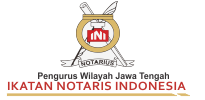AKIBAT HUKUM BAGI NOTARIS YANG MENOLAK PROTOKOL DARI NOTARIS LAIN
Abstract
Notary is a public official authorized to make an authentic deed to the extent that the making of such a certain authentic deed is not reserved for other general officials. The making of an authentic deed is required by law and regulation in order to create certainty, order and legal protection. In addition, the authentic deeds made by or before the notary are not only required by legislation, but also because it is desired by the parties concerned to ensure the rights and obligations of the parties. Notary became one of the general officials who provide services in the form of archiving files that have been done by the parties. What is meant by filing is to bind any legal acts committed by the parties in the notary's office. To achieve the objectives used legal juridical Normative research is the study of the law that focuses on the study of documents or bibliography, but to complement the data obtained from the study of documents or library then conducted field research, ie from the sources. Data analysis used is qualitative data analysis. Notary pursuant to Article 1 paragraph 1 of Law number 2 of 2014 concerning Position, Notary is a public official authorized to make authentic deeds and other authorities as referred to in this law. And still in Article 1 paragraph 13 UUJN (Position Notice Act) Protocol is a collection of documents that are archives of the state that should be kept and maintained by a notary. From the result of research and discussion it is concluded that rejecting protocol from other notary is not justified, because every notary must accept protocol from other notary it is stated in Notary Appointment Letter. Notary holder of the protocol shall only be responsible for securing state documents, submitting minas deed if necessary, in case of responsible criminal acts shall remain the notary making. It is stipulated in the Notary Office Law Article 65 that a notary, a substitute notary, a notary public official is responsible for every deed he has made even though the notary protocol has been transferred or transferred to the notary notary of the notary protocol. The rejection of the notary protocol is not an unlawful act, the unlawful act that exists in the notary profession is anything that is concerned with the product made by a notary (authentic deed). The supervision of a notary is conducted by the Minister by appointing the MPD (Regional Supervisory Council) in the case of notary protocol is the regional supervisory board to conduct reprentative and reprefentative supervision to impose administrative sanctions in the form of oral reprimands, written warning, dismissal, dismissal with respect and disrespect dismissal. Administrative sanctions are provided based on investigation team results, so MPW may impose sanctions on the notary who rejects the protocol.
Keywords: Notary Public, Notary Protocol, Notary Supervisory Board.
Full Text:
PDFDOI: http://dx.doi.org/10.30659/akta.v4i2.1787
Refbacks
- There are currently no refbacks.
Copyright (c) 2017 Jurnal Akta
Jurnal Akta has been indexed by:
Editorial Office: Jurnal Akta Room 2nd Floor Imam As Syafei Building Faculty of Law Universitas Islam Sultan Agung. Jln. Kaligawe KM. 4, Semarang City, Central Java, Indonesia. Phone +62 24 6583584 Fax +62 24 6582455
Email: jurnalakta@unissula.ac.id

![download[4]](https://jurnal.stiki-indonesia.ac.id/public/site/images/adminjurnal/template_jurnal_tosca1.png)














